ImmiPartner - Immigration News Update - February 15, 2021
Biden reinstates Covid-19 related travel ban: On January 25, 2021, the President via a proclamation indefinitely suspended entry of foreign nationals entering the US from certain countries. Foreign nationals who do not qualify for an exception and who were present for 14 days preceding their US travel in South Africa, Brazil, Schengen Countries, Ireland or the United Kingdom were banned from entering due to public health concerns. Additionally, starting January 26, 2020, all air passengers coming to the United States, including U.S. citizens, are required to have a negative COVID-19 test result or documentation of recovery from COVID-19 before they board a flight to the United States. The guidance is silent on land travelers at this time.
FY2022 H-1B cap initial registration to commence on March 9, 2021: On February 5, 2021, USCIS announced that initial registration period for the fiscal year (FY) 2022 H-1B cap will open at 12 pm March 9, 2021 and run through 12 PM March 25, 2021. During this period, petitioners and representatives will be able to fill out petitioner and beneficiary information and submit their registrations. For more information, please visit here.
H-1B selection rule for this cap season remains unchanged: On February 4, 2021, DHS delayed the effective date of H-1B selection final rule to December 31, 2021 which created a wage-based selection process for H-1Bs. For the upcoming H-1B cap season, USCIS will apply the current regulations and conduct the random computerized H-1B cap selection process like the previous year. This year too, USCIS will conduct two rounds of selections to meet the annual cap of 85000 H-1B visas. The first round will include all registrations to meet the regular cap of 65,000 and the second round of selection will be for US masters and above holders not chosen in the first lottery to meet the advanced-degree cap exemption of 20,000 visas.
USCIS continues to extend RFE response deadlines: In response to the ongoing pandemic, on January 28, 2021, USCIS is further extending the flexibilities in responding to requests and notices including Requests for Evidence, Notices of Intent to Deny, Notices of Intent to Revoke; Notices of Intent to Rescind, Form I-290B, Notice of Appeal or Motion issued by USCIS. Petitioners and applicants have an additional 60 days beyond the due date to respond to certain requests and notices issued by USCIS between March 1, 2020, and March 31, 2021, inclusive.
ICE continues to extend flexibilities in rules related to Form I-9 compliance till March 31, 2021: Owing to the ongoing pandemic, on January 27, 2021 ICE has relaxed in-person verification of identity and employment eligibility document for remote workers. The policy allows employers that are operating remotely to conduct virtual employment authorization and identity verification using fax, email or video link, video call. If there are employees physically present at a work location, no exceptions are being implemented at this time for in-person verification.
Biden administration executive orders: As of February 2, 2021, the President signed a new executive order calling upon the Federal Agencies to review existing regulations, orders, guidances, rules, documents, policies, affecting legal immigration. The order is meant to restore and promote integration, inclusion, and citizenship. The order will not have any immediate changes that will impact foreign nationals in the U.S. However, it is a signal for agencies to start work on progressive rule making and policy changes during this administration. In brief, the executive order’s main points are:
Identify barriers that impede access to immigration benefits and ensure fair, efficient adjudications of these benefits.
Provide recommendations for removal of these barriers and submit a report the progress of such recommendations within 180 days;
Identify any agency actions that fail to promote access to the legal immigration system, such as the USCIS Fee Schedule Rule aimed at increasing filing fees and recommend steps to revise or rescind those agency actions;
Relevant department / agency heads to conduct immediate review of the current implementation and effects of the Public Charge rule. Within 60 days of this order, these agencies must submit a recommendation report to the President with steps to be taken to clearly communicate current public charge policies and proposed changes. Please note that as of today, the DHS public charge rule remains in effect and that the Form I-944 is currently required in all jurisdictions. [Re public charge rule: Under current regulation, every foreign national seeking to enter as a non immigrant or immigrant including when applying for adjustment of status to a green card holder or when extending/changing status to another non immigrant visa type, is required to confirm that they are not likely to become a public charge].
Within 60 days of the date of this order, develop a plan to promote and improve naturalization process including reducing processing timelines, fee reduction/waivers, eliminating potential barriers related to N-400 application (fingerprinting, background checks, interviews, and language tests).
